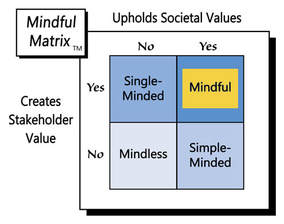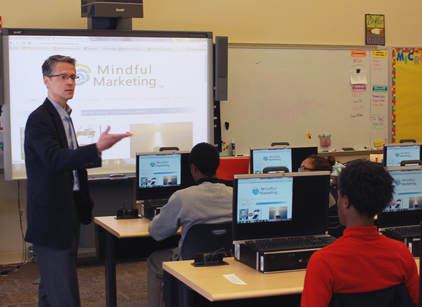Live Q & A would be a great approach for this retrospective, but since I can’t take call-in questions, I’ll try to anticipate what’s on people’s minds. By the way, if you would like to offer feedback and are pressed for time, here’s a link to a brief survey, which I’ll share again at the end:
MindfulMarketingSurvey2017
Q1: When and why did you develop Mindful Marketing?
A1: After nearly 25 years working in marketing-related positions in business and in higher education, I felt compelled to do something more to encourage ethical behavior in the field. At its core, marketing is morally sound. Its aim to bring about mutually beneficial exchanges (win-win outcomes) is truly honorable. Unfortunately, though, some so-called marketers abandon those central tenets, hurting consumers and tarnishing the discipline. I want to change that behavior and restore a reputation of respect.
I developed the Mindful Marketing concept and related branding (logos, website, etc.) a little over three years ago, during the summer of 2014. The core of Mindful Marketing has been the Mindful Matrix, which visually captures the movement’s central concept: that good marketing is both effective and ethical. Although this model is admittedly simple, it took some time to develop each of the categories. Special thanks in that process to my wife Lili and to Nick Shulgach, who continues to be a great sounding-board and source of Mindful Marketing ideas.
Q2: When did the blog begin?
A2: The first Mindful Matters blog post came on September 27, 2014: "CVS Quits Smoking," which determined the retail chain’s decision to drop tobacco products from its stores was “Mindful Marketing.” I had never blogged before but thought such a social media presence could be a good way of spreading the Mindful Marketing concept.
Q3: Where do you get ideas for the blog?
A3: I love news, especially business/marketing news. Whenever I hear a story that I think has potential, I add it to a growing list. I also regularly receive suggestions from friends, family, colleagues, etc. Some of the people who have made recommendations that I’ve used, with links to the respective posts, include: Alan Adler, Randy Basinger, Michael Boyles, Allison Grindle, Daniel Hagenbuch, Leah Hagenbuch, Vince LaFrance, Keith Quesenberry, and Dwayne Safer.
I’ve also appreciated having a couple experts write about their ideas. Both Laureen Mgrdichian and Keith Quesenberry have composed several great guest posts, for instance: Birthday Cheer or Profiteer? and Sex in Advertising: Touchdown or Fumble?
Q4: Have you missed any posts over the last three years?
A4: No! Thanks to an unending supply of ideas and several guest posts, there’s been an entry every week. That’s 158 posts, including this one, about topics ranging from diversity in advertising, to slackfill in product packing, to RFID chips in employees.
In terms of the Mindful Matrix categories, here’s how those evaluations have played out:
60 - Mindful
50 - Single-Minded
11 - Simple-Minded
37 - Mindless
Q5: Do you have a favorite post?
A5: Of course, I like them all! One that I’ll always remember, though, I wrote on October 24, 2015, titled “Fantasy Sports Ads Mislead and Violate the FTC.” The online news magazine Quartz ran a version of the post on its site. Later, I received a phone call from a reporter for the Boston Globe, who interviewed me for an article he then wrote on fantasy sports ads. Someone from FTC Watch also spoke with me. If you’ve seen any fantasy sports ads lately, you’ll notice they’re no longer emphasizing atypical results. Maybe that blog post had an impact.
When writing each post, I also try to come up with a catchy title and an interesting picture. One of my favorite titles and pictures was for a piece I wrote about Animal Planet’s new TV program “My Fat Pet,” which is about the ‘trials’ of pet owners whose animals are overweight. I titled my post “My Pooch is Too Plump” and photo shopped french fries in front a picture of a rotund beagle. Well, it still makes me laugh.
Q6: Who is Mindful Marketing reaching and what is its impact?
A6: Two key target markets for Mindful Marketing are marketing students and practitioners. Hopefully students will embrace the idea that all marketing should be both effective and ethical, then carry that belief with them into their careers, which will eventually lead to positive change for the discipline.
Another important target market is ‘people who care,’ i.e., others who realize the nearly unparalleled influence marketing has on our world and want to see that impact be more consistently constructive.
I use the Mindful Marketing concept (Matrix) in classes almost every day. Other faculty across the country and abroad also use Mindful Marketing with their students to varying degrees, such as Vahagn Asatryan, Laurie Busuttil, Geoff Lantos, Laureen Mgrdichian, Keith Quesenberry, and Mike Wiese.
In addition, I’ve had the opportunity to share the concept with other audiences ranging from elementary school students to Ph.D.s. It’s amazing how quickly people pick-up the paradigm and start to apply it: “That’s Single-Minded,” “That’s Mindless,” etc.
By the way, Mindful Marketing isn’t about agreeing on the ‘right’ answer; it’s about giving people a common framework for discussing important moral issues and encouraging ethics conversations that otherwise won't occur.
Every week, hundreds of people read the Mindful Matters blog through posts in social media like Twitter and LinkedIn, and MindfulMarketing.org gets thousands of page views each week from people around the world. In addition, Mindful Marketing periodically receives other publicity, such as a presentation at the American Marketing Association’s Marketing & Public Policy Conference and opinion articles:
- What Super Bowl ads can teach entrepreneurs about marketing
- Here's what Super Bowl advertisers need to do to win the big game
What’s most motivating is the positive feedback users often offer, such as one student who said:
“I love how accessible and interesting it was. It made all of the concepts in class much easier to relate to, as it showed a real-life application of those concepts. I also liked having a simple model to work from; I will definitely be thinking of the matrix in the future whenever I see ads!”
Q7: What does the future hold for Mindful Marketing?
A7: The big audacious vision for Mindful Marketing is that the paradigm will became part of every marketer’s decision-making: Each time they develop a new strategy or tactic, they will ask if it’s both effective and ethical, in other words, “Is it Mindful Marketing?”
For this vision to take shape, it will mean many more people playing active roles, e.g., using the Mindful Matrix in their classes and businesses, writing articles, and providing leadership in other ways that I haven’t even imagined. That’s a good segue back to the survey and my request . . .
I would love to hear your thoughts about Mindful Marketing, including ideas that might help Mindful Marketing more effectively fulfill its mission and realize the vision I just described. When you're able, please complete the brief survey that’s available through the following link:
MindfulMarketingSurvey2017
Thank you in advance for your input and for sharing the desire to see more “Mindful Marketing.”
Learn more about the Mindful Matrix and Mindful Meter.
Check out Mindful Marketing Ads and Vote your Mind!






 RSS Feed
RSS Feed